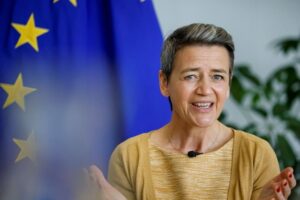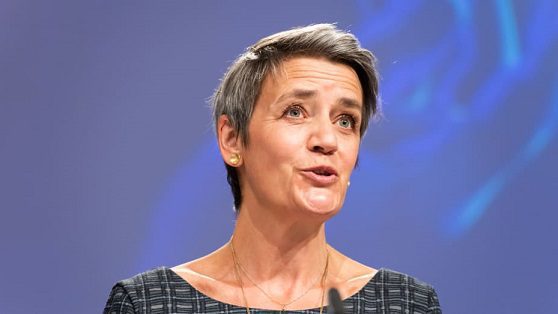EU Chief Economist: The American candidate for one of the European Union’s top economists has withdrawn due to political controversy. Yale economics professor Fiona Scott Morton resigned after Emmanuel Macron criticized her nationality.
A letter to the EU’s executive Commission was released early Wednesday. believed resigning as Chief Economist was best. The EU, which wanted an American economist in this prestigious position, was set back by this decision.
EU Competition Commissioner Margrethe Vestager, who helped endorse the American candidate, regretted the withdrawal. Vestager hoped Scott Morton would continue to champion strong competition enforcement with her extraordinary skills.
The appointment was controversial before Macron’s criticism. The French President’s objections were decisive. Macron said at a recent EU summit that appointing an American expert to oversee European competition matters was a mistake if the EU wanted strategic independence.
“Is there really no great European researcher with academic qualifications that could do this job?” Macron questioned, emphasizing the need for an EU citizen who could advise the European Commission.
Scott Morton was named chief competition economist in the EU’s executive commission’s single market fairness department. Consumers, businesses, and the European economy were supposed to benefit.
Macron’s concerns reverberated throughout the EU, echoing those who opposed the appointment. The French President insisted on commission answers despite Scott Morton’s elite credentials. He also questioned whether EU laws allowed hiring a non-EU citizen for such a crucial role.
The controversy raises questions about the EU’s high-profile appointment process. The EU’s consideration of an American for a key economic position shows its value of global expertise as one of the world’s largest economic blocs. However, the pushback from leaders like Macron shows the delicate balance between international talent and regional representation.


READ MORE: Trump Target letter: Trump Targeted in Explosive DOJ Election Probe
The EU must now reassess its selection process and address member state concerns. With 450 million people, the bloc must assess whether it is using its talented economists and researchers. The EU struggles to balance openness, international collaboration, and regional representation.
Stakeholders and observers in the EU are discussing Scott Morton’s withdrawal. It may reinforce the idea that non-Europeans have trouble getting influential EU positions. To ensure robust and forward-thinking EU economic policies, some argue that the best-qualified candidate should be chosen regardless of nationality.
This setback will determine how the EU reacts. The bloc’s selection process may affect its economic leadership. The EU must carefully navigate globalization and ensure that its policies reflect the interests and aspirations of its diverse member states as competition from Asia and North America grows.
The economist has garnered attention while the EU’s leadership deals with Scott Morton’s withdrawal. Some view Scott Morton’s refusal to accept the position as a principled one. She prioritized the selection process’s integrity and the position’s credibility to ensure the EU’s economic policies are based on the best expertise.
The EU’s economic leadership is at a crossroads. This episode will certainly inform future high-level appointments and the delicate balance between global talent and regional representation. These challenges will determine the EU’s global economic leadership.
Our Reader’s Queries
Who is the EU chief?
European Council president, Charles Michel, revealed his decision to step down early in order to pursue a seat in the upcoming European parliamentary elections. Michel plans to run for a position in the European Parliament in June, leading to his early resignation.
What is the role of the chief economist?
The chief economist holds the key role in leading and producing economic and financial analysis.
Who is the commissioner of the European Union?
Ursula von der Leyen has been serving as the President of the European Commission since December 1, 2019. She holds the position of Chief Executive in the European Commission.
Who is the chairman of the European Commission?
Ursula von der Leyen took on the role of President of the European Commission in 2019. On July 16th of that year, she presented her policy guidelines to the European Parliament after they confirmed her appointment.

